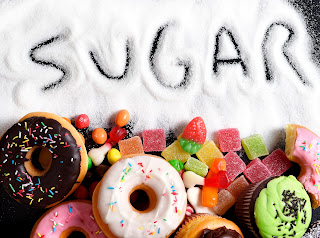Food Addiction
Binge eating behaviors, cravings, and a lack of control characterize food addiction. When it comes to food. Although it is not recognized in the Diagnostic and Statistical Manual of Mental Disorders (DSM-5).
Although a person who occasionally overeats or experiences cravings won't likely meet the criteria for the disease, there are at least 8 frequent symptoms.
What is Food Addiction?
Highly appealing foods (which are frequently high in fat, sugar, and/or salt) cause brain chemical reactions in people with food addictions.
That leads to feelings of pleasure and satisfaction. Due to the activation of the same brain reward center.
This reaction has been compared to an addict's reaction to their preferred drug. Food addicts develop a dependence on the "pleasant" feelings that come from eating particular foods.
which frequently keeps them craving food even when they are not hungry.
There is a vicious loop created by these actions. The food addict frequently indulges and eats more than is necessary.
for satiety and proper nutrition as long as they continue to binge on things that make them feel good.
This may have several negative physical, psychological, and social effects.
including heart disease, obesity, low self-esteem, depression, and social isolation.
Due to the demand for induced emotions of pleasure, a food addict frequently resumes these harmful actions despite unintended consequences.
It is critical to seek professional assistance because of the vicious cycle of food addiction and the negative effects connected with this habit.
Think about the possibilities of a life without this burden if you or a loved one have been battling an eating disorder.
By getting the proper treatment and assistance you require, you may overcome food addiction.
Signs and Symptoms of Food Addiction
➡ Consuming Far More Food than Intended
A single slice of cake or a mouthful of chocolate may not exist for some folks.
One mouthful multiplies into twenty, and one piece of cake multiplies into a half-piece.
Addiction of any kind frequently takes an all-or-nothing stance. Moderation does not exist since it is ineffective.
To advise someone who struggles with food addiction to consume junk food in moderation is like advising an alcoholic.
To consume booze in moderation. It's simply not possible.
➡ The Feeling of Guilty After Food Consumption
Feelings of guilt may result from attempting to regulate one's intake of harmful foods before caving into a need.
A person could believe that they are acting improperly or even deceiving themself.
A person who has a food addiction will continue the behavior despite these unpleasant feelings.
➡ Repeatedly Failing to Set Standards
People who have trouble maintaining self-control frequently make rules for themselves.
Examples include never consuming coffee after a specific time in the afternoon, and always finishing schoolwork directly after school.
And always sleeping in on the weekends. Most people nearly always break these norms, and eating-related rules are no exception.
Examples include allowing yourself one cheat meal or day per week and only indulging in junk food during special occasions like birthdays or vacations.
➡ Inability to Stop Eating Despite Physical Issues
The foods you choose to eat can dramatically influence your health.
Junk food can cause weight gain, acne, foul breath, exhaustion, poor dental health, and other problems in the short term.
Obesity, type 2 diabetes, heart disease, Alzheimer's, dementia, and even some types of cancer can result from a lifetime of junk food eating.
Anyone who encounters any of these issues because of consuming unhealthy foods and yet. Cannot alter their behavior, and probably requires assistance.
To treat eating disorders, I often advise that you follow a plan of care created by trained specialists.
➡ Eating until One Feels Uncomfortably Full
An individual with food addiction may not stop eating once they give in to a craving and consume enough.
They may subsequently realize that they have eaten so much that they feel absolutely full.
Binge eating is when a person eats until they are overly full, either regularly or constantly.
What Leads to a Food Addiction?
The culmination of several elements that interact to create this condition is probably food addiction.
An addiction can arise for biological, psychological, or social reasons in a man or woman.
- Hormonal imbalances
- Anomalies in different brain structures
- Negative effects from the usage of specific drugs
- Having family members with this type of addiction disorder
These are all examples of biological causes that may affect the evolution of this eating disorder.
The outcome could also be due to psychological factors, such as
➡ Being the victim of or having survived a traumatic event,
➡Being emotionally or sexually abused,
➡ Struggling to deal with bad situations in a healthy way
➡ Having low self-esteem
All fall under this category.
Psychological issues like these may lead someone to turn to food as a coping method to deal with the resulting painful emotions.
Last but not least, food addiction may have social repercussions, including things like disruptions in family life, peer or societal pressure, social isolation, and child abuse.
Besides a lack of social support and stressful life events.
Additionally, other co-occurring disorders, like substance abuse or eating disorders, can coexist with food addiction.
I strongly advised that professional help be sought in order to successfully recover from food addiction.
because it is a challenging mental health condition that, if left untreated, can lead to major difficulties.
Thankfully, there are specialized food addiction treatment centers that can help you approach this disorder in a holistic and comprehensive manner.
Food addiction treatment centers offer multi-specialty treatment that will focus on and address medical issues and nutritional concerns while integrating psychotherapy.
There is also a myriad of support groups that you can become involved with. Such as Food Addicts Anonymous, Overeaters Anonymous, and Food Addicts in Recovery Anonymous.
These groups are 12-step-based programs that effectively address the physical, emotional, and spiritual aspects.
Offering much-needed support to individuals seeking to heal from their addiction to food.
Attempting to deal with your addiction to food alone might further draw you into fear or isolation.
Having guidance, help, and support from an eating disorder center that treats food addiction, specialist, or support group.
can provide you or your loved one with the tools and resources you need to recover and heal from an addiction to food.
Preventions for Food Addiction
Use smaller dishes and bowls to start, which will make you serve lesser servings. Your brain will acclimate to the smaller portion sizes over time.
However (it can take a few weeks), and you'll start to feel less hungry. Once you've accomplished that, experiment with cutting your portions even more by leaving some room on your plate.
And over time, your brain will gradually but surely adapt. Below are a few tactics to regulate your eating impulsion.
➡ Keep Your Hunger Under Control
When a person with a food addiction resists food until they become ravenous, they frequently end up overeating as a result.
On a scale of zero to ten, where ten represents being overstuffed, rate your level of hunger, and attempt to stay in the middle.
➡ Use Smaller Plates Smaller Portions Equal
Due to the absence of the signals that normally alert the body to cease eating, people with food addiction frequently overeat.
You can genuinely retrain your brain to feel satisfied with less food, claims Mark Gold, MD, chief of addiction medicine at the University of Florida College of Medicine.
Use smaller dishes and bowls to start, which will make you serve lesser servings. Your brain will gradually adjust to the smaller portion sizes over time (it can take a few weeks).
And you'll feel less hungry. Once you've accomplished that, experiment with cutting your portions even more by leaving some room on your plate.
Once more, your brain will gradually but surely adapt.
➡ Exercise Regularly
Exercise has the power to alter the biochemistry of the body. Correcting some of the physiological imbalances that might result in food addiction.
Additionally, if you exercise, you won't be eating during that time.
➡ Avoid Destinations of Huge Food or Food Festivals
When drug addicts return to the area where they used to buy narcotics, chaos ensues. Similar to this, falling back on old habits can make you make mistakes.
Change up your daily routine. Avoid Mexican eateries if tortilla chips are your vice. Walk a different path if passing a particular donut shop makes you less determined.
Instead of always eating ice cream and watching TV at night, try reading a book (or knit as you watch the tube so your hands will be occupied).
READ ALSO:
FAQs on Food Addiction
A person who develops a food addiction has a mental health problem and gets dependent on food, particularly processed junk food.
They implicated the same brain regions involved in drug addiction in food addiction, according to several research studies.
2. What Causes Addiction to Food?
The brain's pleasure centers are activated and "feel-good" neurotransmitters. Like dopamine and serotonin, are released when "highly appealing" foods.
or those heavy in carbohydrates, fat, salt, sugar, or artificial sweeteners, are consumed.
3. Is There a Medication for Food Addiction?
The FDA has given the drug Lisdexamfetamine (Vyvanse) approval to treat binge eating disorders.
The medication, which is also used to treat ADHD, lessens the frequency of episodes. And was the first treatment for binge eating disorder to receive FDA approval.
4. How Long Does it Take to Break Food Addiction?
It should therefore come as no surprise that you can unlearn it as it is a learned taste.
But I'm not sure where to begin. According to Moss, giving off your reliance on processed foods, particularly salt, only takes around six weeks of good eating.
What are the Effects of Food Addiction?
This may have a number of negative physical, psychological, and social effects, including heart disease, obesity, low self-esteem, depression, and social isolation.
Due to the demand for induced emotions of pleasure, a food addict frequently resumes these harmful actions despite unintended consequences.
Make sure it's a nutritious snack if you feel the urge for one in between meals.
Consider consuming whole foods like fruits, nuts, vegetables, or seeds.
Eating the right meals ensures that your body receives the nutrition it requires while also preventing hunger and cravings.







